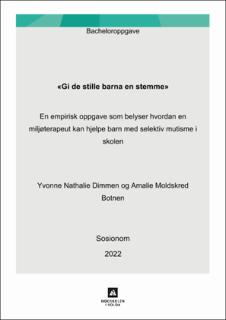| dc.description.abstract | Med denne bacheloroppgaven ønsker vi å sette lys på selektiv mutisme da det er manglende kunnskap rundt denne diagnosen, og dermed bidra til å gi de tause barna en stemme. Forventningene til dagens lærere har blitt mer omfattende og en miljøterapeut i skolen kan bidra til bredere kompetanse som kan være til hjelp. Vi har derfor rettet fokuset på hvordan en miljøterapeut kan hjelpe barn med selektiv mutisme i skolen. I løpet av oppgaven får vi innsyn i hvilke utfordringer de kan møte på, hvordan en kan tilrettelegge og hvordan et samarbeid med de pårørende kan være. For å finne svar på problemstillingen i denne empiriske oppgaven har vi benyttet oss av nettsiden «stillebarn.no» og analysert historiene som er tilgjengelige for å danne erfaringskunnskap. Videre har vi satt dette opp mot faglitteratur og forskning for å se om det er sprik eller samstemthet.
Gjennom denne oppgaven har vi kommet frem til at barn med selektiv mutisme kan ha utfordringer med å bli misforstått. Samlet sett ser vi at utfordringen for barna er å ha full deltakelse i skolen. Tilrettelegging som en trygg voksen med kompetanse innenfor diagnosen kan være nyttig for å kartlegge ulike behov. Studien viser videre at alternativ læring, mindre grupper, brukermedvirkning og empowerment er viktige verktøy for barna i skolehverdagen. Svaret på problemstillingen er derfor å forstå at barnet kan oppleve å ikke ha full deltakelse i skolen. Dette kan føre til marginalisering, og miljøterapeuten kan kompensere for problemet med å være en trygg voksen og tilrettelegge slik barnet er utstyrt med ulike verktøy som kan gi de mulighet for faglig og sosial mestring. Det kan bidra til mer deltakelse i skolen og hindre marginalisering. Ved å sørge for et godt samarbeid med pårørende kan vi få til utvikling og fremgang for barnet med selektiv mutisme. En kan derfor si at pårørende kan bidra som en ressurs for å hjelpe barnet til å mestre skolehverdagen. | en_US |
| dc.description.abstract | Abstract
With this bachelor's thesis, we wish to bring focus on selective mutism because of the lack of knowledge around this diagnosis and we want to give the silent children a voice. The expectations of today's teachers have become more extensive and a milieu therapist in school can contribute to broader competence that can help. We have therefore focused on how a milieu therapist can help children with selective mutism in school. During the task, we get to know what challenges they may face, how to facilitate and how a collaboration with the relatives can be. To find answers to the problem in this empirical task, we have used the website "stillebarn.no" and analyzed the stories available to form experiential knowledge. Furthermore, we have set this up against academic literature and research to see if there is a gap or consensus.
Through this task, we have concluded that children with selective mutism may have challenges in being misunderstood. Overall, we see that the challenge for the children is to have full participation in school. Facilitation as a confident adult with expertise in diagnosis can be useful in mapping different needs. The study also shows that alternative learning, smaller groups, user participation and empowerment are important tools for children in everyday school life. The answer to the thesis question is therefore to understand that the child may experience not having full participation in school. This can lead to marginalization, and the milieu therapist can compensate for the problem with being a safe adult and facilitate as the child is equipped with various tools that can allow them to professionally and social learning. This can contribute to more participation in school and prevent marginalization. By ensuring a good collaboration with relatives, we can bring development and progress for the child with selective mutism. It can therefore be said that relatives can contribute as a resource to help the child to master everyday school life. | en_US |
